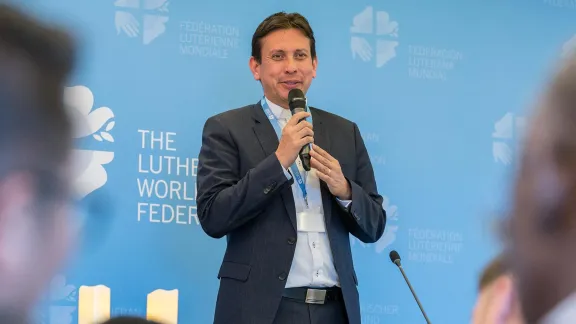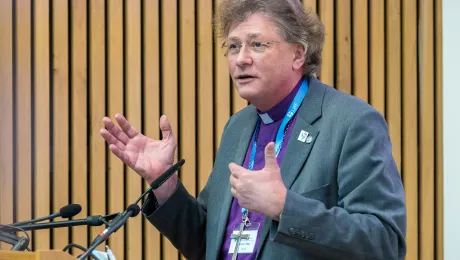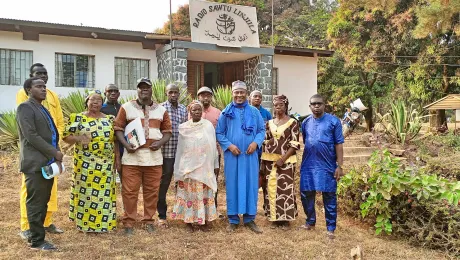
Bishop Atahualpa Hernández Miranda of the Evangelical Lutheran Church in Colombia Photo: LWF/A. Hillert
Voices from the Communion: Bishop Atahualpa Hernández on the history and mission of the church in Colombia
(LWI) - Bridge building by fostering spaces for dialogue and cooperation is an essential task facing Bishop Atahualpa Hernández Miranda, leader of the Evangelical Lutheran Church in Colombia (IELCO).
Faced with polarization in his own church and the challenges of working within an overwhelmingly Catholic context, alongside the daily difficulties of accompanying survivors of the country’s long-running civil war, conflict resolution and peacebuilding have been two key requirements of his job since taking office in 2016.
That same year, the government of Colombia signed a peace agreement with the main guerrilla group to end the conflict that has claimed thousands of lives and left millions more displaced from their lands and livelihoods. As a church leader, Hernández has been closely involved with efforts to implement the terms of that agreement and to bring the other warring parties to the negotiating table.
During a recent meeting in Geneva of the newly elected Council of the Lutheran World Federation (LWF), of which he is a member, Hernández shared insights on his work and on the changing role of the Lutheran church in his country.
Tell us something about the history of the church in Colombia?
The church began in the 1930s when two women from North America came as missionaries to the remote towns and villages in Colombia’s central mountainous region. Colombia is a very Catholic country, so life was difficult for them, but they were pioneers with creative spirits, starting schools for lay people, including women which was not common at that time.
There was a lot of socio-religious violence in these areas and people were persecuted for their faith. Over time, they moved down into the plains and then into the big cities like Bogotá and Medellin. But because of its history, the church has always remained very close to the people who are suffering or displaced. Today, we have about 2,500 members, organized into some 25 communities.
What about your own family’s involvement with the church?
My grandmother, my father’s mother, was the first person to become a Lutheran. She was a Sunday school teacher and I remember her telling me about the difficulties she encountered, about how she prayed for protection when people tried to destroy her house. She had a big influence on my life, my faith, as she was the first person that I saw with a strong personal engagement as part of a church community.
My mother comes from a Catholic family, but when my parents were married, she became a Lutheran too. I grew up in the church in Bogotá and was very involved in different activities like bible study groups, camps and especially music as I loved to play the drums.
Do you still play them?
No, I still have them, but as a bishop, I don’t have much time to play!
When did you decide you wanted to become a pastor?
I always wanted to study theology, but the situation was not easy in our church at that time. I started studying chemical engineering but then moved to theology and was ordained in 2009.
My first parish was in the small town of Trinidad, near the border with Venezuela, which had been going through really challenging times with fighting between guerrilla groups and paramilitaries. At first, I didn’t want to go there and it was not easy for me, but it was a great learning experience and the community taught me so much. By the end of two years, I understood that this is the best “university” for new pastors.
In 2016, you were appointed bishop – what have been your priorities since then?
To try to establish spaces for dialogue because when I was elected, the church was experiencing a lot of polarization and divisions. One of my goals was to recover the possibility for people to trust each other, to overcome the fears and assumptions they had, even within the pastors’ association. It was important to recover the sense of being a united church, even with our differences, and at our last meeting, I am happy to say that I saw a new atmosphere of people working together as a team again.
What do you see as the role of the Lutheran church in Colombia today?
For many years, we had a prophetic role in advocating for people who were suffering. When it became possible for us to be officially established, we started to network with other churches and then became part of DiPaz, the Inter-ecclesial Dialogue for Peace platform which includes the historical churches, the Pentecostals, as well as Catholic and Protestant universities and some grassroots faith organizations.
Through these networks, we try to offer a faith perspective that can contribute to the building of our society. As Lutherans in particular, we talk about restorative justice as part of the healing process [from Colombia’s long-running conflict] and support ways of finding acts of reparation for those involved in crimes to tell the truth about what happened and ask forgiveness from the affected communities.
The 2016 peace agreement was victim centered, urging the government and groups in conflict to find spaces of reparation and truth-telling, but many people voted against it. We figured out this was because many didn’t understand or believed it was unfair if people were not punished for their sins. This is linked to a theological sense of guilt and punishment, so as a church we have a lot to contribute to the conversation.
You have been personally involved with the peace process, haven’t you?
Yes, I have listened to so many testimonies from men and women, young people in particular. What touched me most was that all those who were worst affected by the fighting, those in rural communities who were forced from their land and lost loved ones, supported the peace agreement. In the cities, the situation is very different: you can read about the conflict, but you don’t experience it in the same way.
Our church had a program for former fighters of both the government and the paramilitaries. Some joined up for ideological reasons, but others because their families were killed and they had no other possibilities. They could all see that the peace agreement offered them the chance of a new start in life.
How hard is it for these young people, who have only known war, to adapt to a new way of civilian life?
It is really difficult for them because they have never learnt life skills like cooking or cleaning or looking after themselves. They have only been taught how to fight and they have no idea how to access the finances, medical care or educational opportunities that are guaranteed by the agreement.
We have teams who work with them to provide medical and psycho-social support or signpost them to other professional experts. It is important for them to be part of a community where they can share their traumas, but also their dreams and their hopes.
How much progress is the country making towards a more peaceful society?
The peace agreement is between the government and the largest paramilitary group, the Revolutionary Armed Forces of Colombia [FARC]. The second largest, the National Liberation Army [ELM] is currently in negotiations. We have a female Presbyterian pastor taking part in those talks and we celebrate this because for many years, it was only the Catholic Church which was able to sit at the table. Dissidents of the FARC also invited me, through the World Council of Churches (WCC), to be part of an observer delegation, which I did at the beginning but now there is a WCC person filling that role.
I remember a U.N official at our first meeting saying that every effort to contribute to peace is a small victory, so in that sense there is progress, but there are also many bombs and kidnappings still happening. In many places where the fighting has stopped, there are a lot of economic interests with groups trying to control the drug trade and human trafficking routes. But unlike the previous government, the current one is really engaged with the peace process and communities are making progress, even if you still read news of the conflict.
What are your own hopes for the future of the country?
Despite all the challenges, we have to keep working for peace, for justice, for reconciliation, for more opportunities for young people. I have two daughters, aged 14 and 16, and I want them to have a different future, a peaceful future in Colombia.


